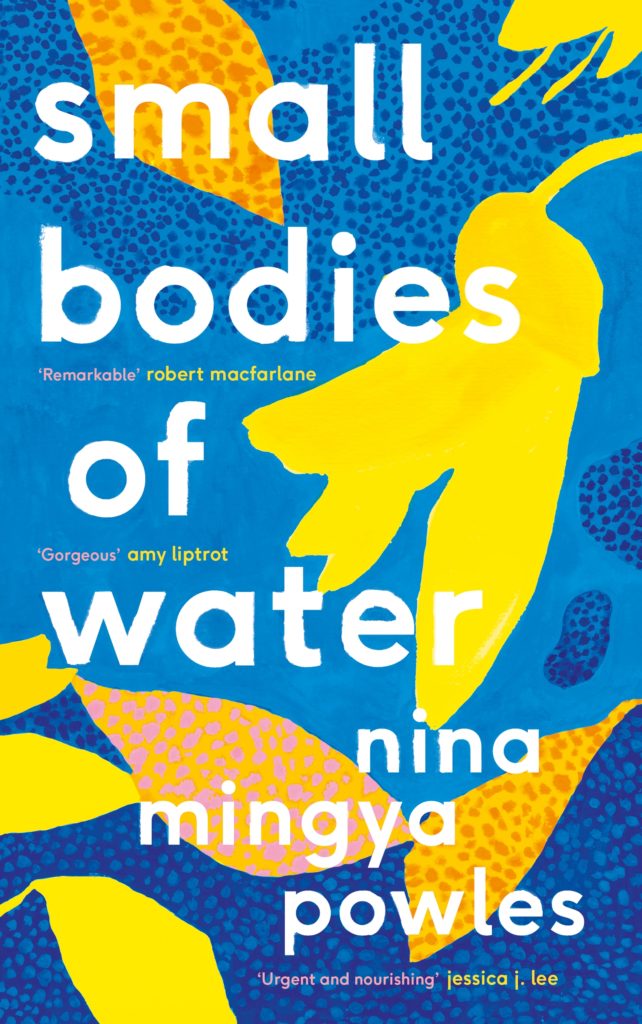Isaac Yuen reviews our August Book of the Month, finding disparate locales and diverse cultures connected by Nina Mingya Powles’ rich and tender prose.

‘Where is the place your body is anchored? Which body of water is yours? Is it that I’ve anchored myself in too many places at once, or nowhere at all? The answer lies somewhere between. Over time, springing up from the in-between space, new islands form.’
Memory. Identity. Belonging. Home. This is a collection that seeks and recalls these concepts, forges and reforms these notions. Its essays take place in brightly chlorinated pools and along high tide bays, are contained within jars of formalin and brushstrokes of calligraphic ink, are expressed in the roil and fury of outer shores and innermost bodies — all liquid in their construction and manifestation.
As a poet and essayist, Nina Mingya Powles wields both her words and their flow to convey a constant searching and yearning across continents and decades. Launching off from her introductory piece ‘A Girl Swimming is a Body of Water’, Small Bodies of Water employs the full versatility of creative nonfiction forms to weave together the formative encounters and experiences in the author’s life. In ‘Ache’, a swimming diary catalogues moments of repose at Hampstead Heath and Wellington Harbour. In ‘Archive of Waterfalls’, the colours of objects anchor a tribute dedicated to her ichthyologist grandfather. In ‘Tofu Heart’, forms of soy offer grounding and comfort through a time of global isolation and uncertainty. Shanghai. London. Aotearoa. Malaysia. With each tale, Powles moves in mind and thought between places she had once inhabited or is still inhabiting, between tongues she knows or is still learning, using herself as the conduit with which to connect disparate locales and diverse cultures. Small Bodies of Water is a river both in and of making, with each chosen memory akin to a pebble deposited along the streambed, fragmented from the central source, arbitrary in its significance, unique in its own way of sculpting and being sculpted by the currents of time and living.
‘Sometimes home is not a place but a collection of things that have fallen or been left behind: dried agapanthus pods, the exoskeletons of cicadas (tiny ghosts still clinging to the trees), the discarded shells of quail’s eggs on Po Po’s plate, cherry pips in the grass, the drowned chrysanthemum bud in the bottom of the teapot.’
Besides being rich in texture and temperature, Powles’ prose style is also notable for its restraint. Scenes and objects are rendered in vivid, measured strokes with sufficient empty space to meditate upon. Personal stories are afforded both intimacy and distance by a skilled narrator without the pretension of ego. Mundane observations are treated with the same care as surreal events, as part and parcel of an examined life. Powles navigates the issues that permeate her life and our modern society — colonial legacies, cultural stereotypes, language and familial loss, climate change — deftly, subtly, aided by a deliberate and effective air of quiet understatement. Always there is tenderness, never in a form that can be construed as weakness, but rather as manifestations in empathy and resilience. We shall need more such souls able and amenable to refashioning themselves going forward — spirits open to ponder, to grow, to linger.
In her essay in the middle of the collection titled ‘Plum Rains,’ Powles writes about her fondness for the films of Japanese filmmaker Hayao Miyazaki and the ephemeral waterscapes his female protagonists find themselves in. There exists another film from the same studio, less fantastical, more reminiscent. In it, a woman weary of city life takes a vacation to the countryside and finds herself overwhelmed with childhood remembrances, spilling out in scenes crafted as sparse watercolour vignettes. Common elements to Powles’ collection: Navigating the social stigma around menstruation. Familial bonding over fruit. A loving emphasis placed on brilliant yellow flowers. Hard rains. Clear streams. Choices made at the crossroads of life. Released exactly three decades ago, Only Yesterday is its English title, but is called Omoide Poro Poro in Japanese, which can be translated as memories tumbling forth one after another, trickling down like falling raindrops, like tears, like small bodies of water.
*
‘Small Bodies of Water’ is out now, published by Canongate. Order a copy here (£14.99). You can read an extract from the book, published earlier this month, here.
Isaac Yuen pens short stories and personal essays exploring forms and themes around nature, culture, and identity. Visit his website here, or follow him on Twitter here.